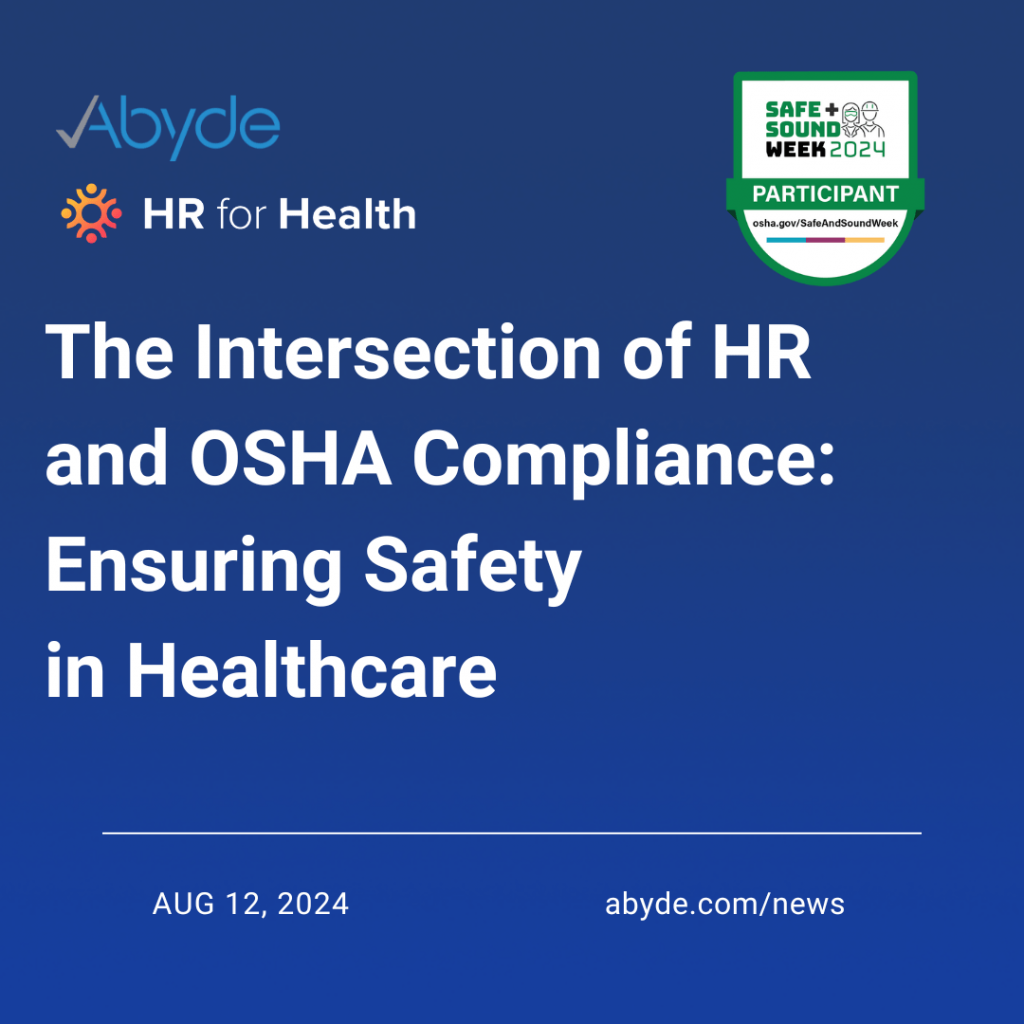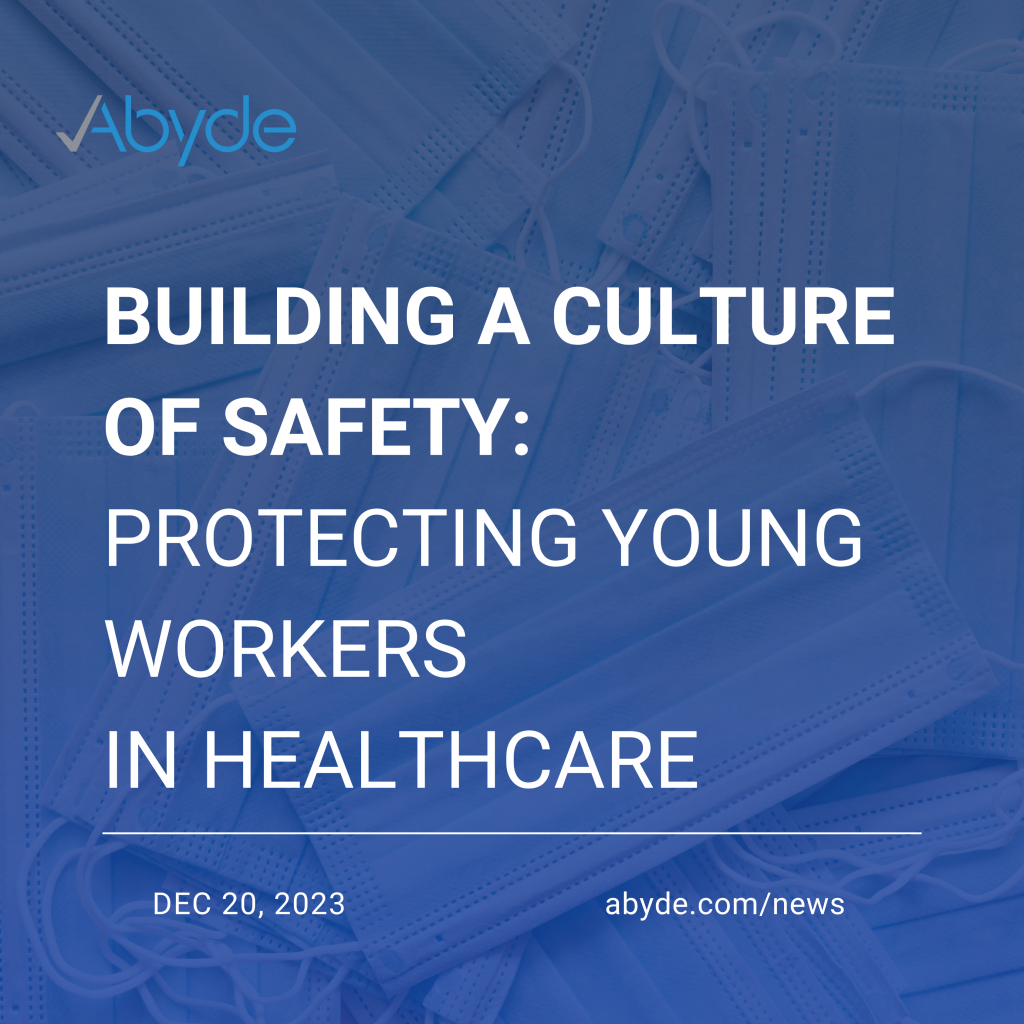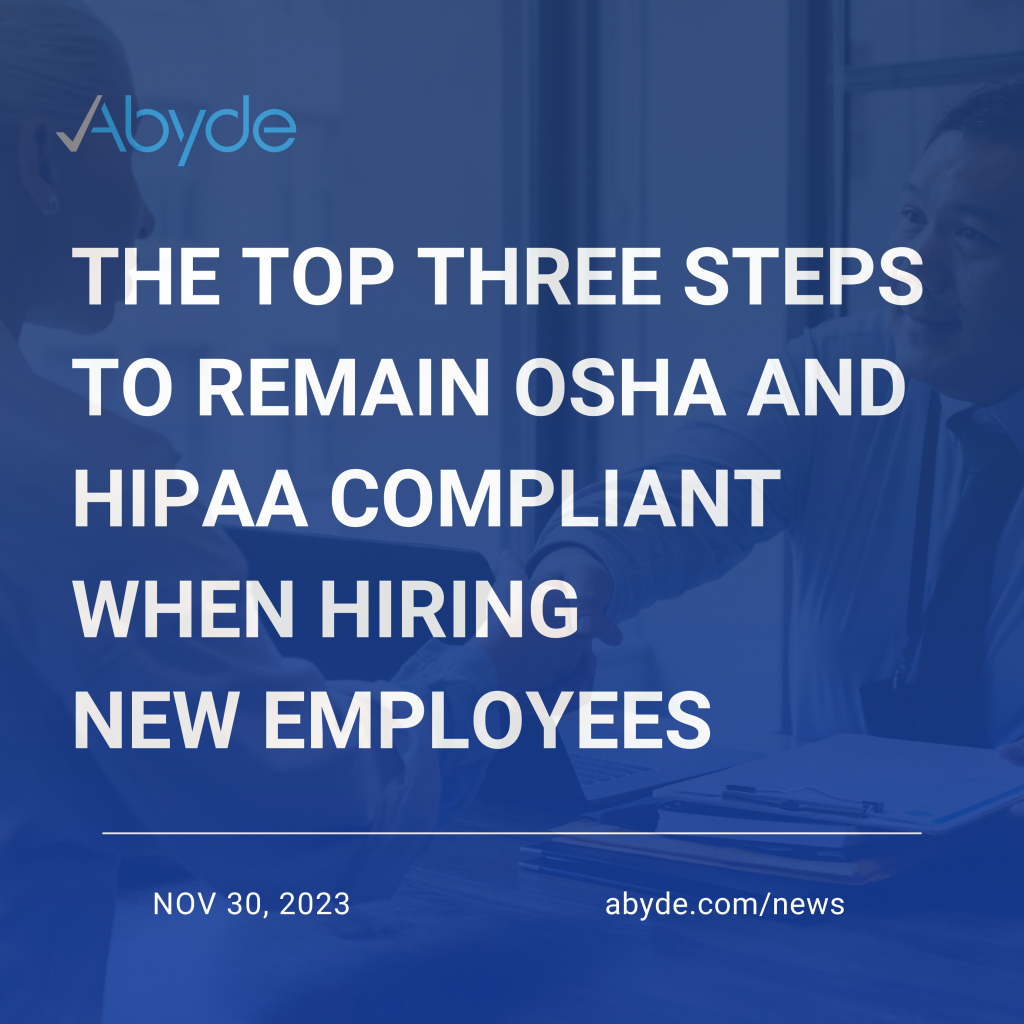August 12, 2024 This was contributed by HR for Health for OSHA’s Safe + Sound Week At HR for Health, OSHA compliance is a frequent and critical topic of discussion with our clients. As an HR company focused on supporting independent healthcare practices, we understand the importance of taking compliance, training, documentation, and safety seriously. Whether your practice is large or small, adhering to OSHA standards is not just about following the rules—it’s about protecting your employees and fostering a safe work environment that benefits everyone. Compliance laws can seem overwhelming, but it’s a non-negotiable part of running a healthcare practice. Non-compliance can lead to significant penalties, not to mention the time-consuming and expensive lawsuits that could arise if an employee or patient is injured. Beyond the financial implications, a commitment to safety and compliance contributes to a healthier, more productive workplace. But how do you ensure your practice stays compliant without getting bogged down in administrative tasks? That’s where HR for Health and Abyde come in. Together, we provide a comprehensive solution that simplifies the complex worlds of OSHA and employment law compliance, making it manageable for practices of all sizes. Why OSHA Compliance Matters OSHA (Occupational Safety and Health Administration) compliance is about more than just avoiding fines. It’s about creating a workplace where your employees feel safe and supported, which in turn leads to better patient care. Compliance involves familiarizing yourself with OSHA regulations, training your employees, and maintaining accurate records of any incidents or hazards. At HR for Health, we see firsthand how often OSHA compliance comes up in our conversations with clients. It’s a constant concern, and rightly so—OSHA compliance isn’t a one-time effort but an ongoing process. That’s why we’ve integrated powerful features into our platform to help you stay compliant effortlessly. Simplifying Compliance with HR for Health Our software is designed to automate and streamline many of the tasks associated with OSHA compliance. For example, our Continued Education automated alerts and updates ensure that your team stays on top of mandatory training and certifications. This feature is crucial because it ensures that your employees are always up-to-date with the latest safety protocols, which helps in maintaining a safe workplace. Documentation is another critical aspect of OSHA compliance. Your practice needs to keep detailed records of any work-related injuries or illnesses, as well as potential hazards. HR for Health offers unlimited e-document storage, so you never have to worry about running out of space or losing important documents. This secure storage solution means that all your compliance-related documents are organized, easily accessible, and safe from loss or damage. But compliance isn’t just about keeping records. It’s also about communication and ensuring that everyone in your practice is on the same page. Our platform includes integrated messaging, task management, and performance reviews, which help facilitate clear communication and make sure that no critical tasks are overlooked. This holistic approach to compliance ensures that your practice runs smoothly and that your employees are always aware of their responsibilities. Partnering with Abyde for a Complete Solution While HR for Health handles many of the HR aspects of compliance, we’ve partnered with Abyde to provide a complete OSHA compliance solution. Abyde’s platform is designed specifically to help healthcare practices navigate the intricacies of OSHA regulations. Their OSHA checklist is an excellent starting point, helping you identify which regulations apply to your practice and what steps you need to take to comply. Abyde also simplifies the training process. OSHA training is essential for ensuring that your employees understand safety protocols and know how to respond in case of an emergency. Abyde’s platform makes this training straightforward for managers and easy for employees to follow, reducing the administrative burden on your practice. Once your employees are trained, Abyde helps you maintain compliance with their tools for documenting safety and health incidents. This includes managing Work-Related Injury & Illness Logs and Sharps Injury Logs, which are critical for demonstrating compliance during an OSHA inspection. Creating a Culture of Safety Compliance isn’t just about avoiding penalties—it’s about creating a culture of safety within your practice. By working with HR for Health and Abyde, you’re taking proactive steps to ensure that your workplace is as safe and efficient as possible. This not only protects your employees and patients but also enhances the overall productivity and morale of your team. OSHA compliance is a vital component of running a successful healthcare practice. By leveraging the combined strengths of HR for Health and Abyde, you can simplify this complex process and focus on what truly matters—caring for your patients and growing your practice. Ready to take your practice’s OSHA compliance to the next level? Visit HR for Health and Abyde to learn how our platforms can help your practice succeed.
Building a Culture of Safety: Protecting Young Workers in Healthcare
December 20, 2023 Protecting patients and our young workforce is a shared responsibility. At Abyde, we’re committed to safety, both for patients and for the dedicated individuals who keep our healthcare systems running. That’s why the recent tragedy at Florence Hardwoods sawmill in Wisconsin hit us hard. A 16-year-old worker, tragically, lost his life due to operating dangerous machinery without proper training. This heartbreaking incident underscores a crucial point: age restrictions matter when it comes to workplace safety, especially when dangerous equipment is involved. The U.S. Department of Labor’s investigation revealed Florence Hardwoods failed to train both teenage and adult workers in safety procedures, exposing them to avoidable hazards. This blatant disregard for regulations and basic human safety is unacceptable. As Abyde, we stand firmly against the use of underage workers for tasks that put them or others at risk. Why is this so important? What can we do? The tragedy at Florence Hardwoods serves as a stark reminder that workplace safety isn’t just about following regulations; it’s about protecting lives. At Abyde, we urge all healthcare institutions, to re-evaluate their safety protocols and ensure that age-appropriate restrictions are in place to protect young workers from harm. It’s time to say “no more” to child’s play with dangerous medical equipment. Let’s create a safer future for everyone in the healthcare workplace. Together, we can prevent future tragedies and ensure that every healthcare worker, regardless of age, returns home safe and sound every day. Additional Resources
The Top Three Steps to Remain OSHA and HIPAA Compliant when Hiring New Employees
November 30, 2023 In the fast-paced realm of healthcare, where patient confidentiality and workplace safety are paramount, hiring new staff demands meticulous attention to HIPAA and OSHA compliance. From the moment a new employee steps through the door, it’s crucial to instill a culture of compliance. Here’s a breakdown of the top three steps a medical practice should take during the onboarding process to ensure their team members are well-versed in compliance. 1. Training: The Foundation of Compliance Training is the bedrock of a compliant workforce. Before the employee even starts to perform job duties, invest time and resources in comprehensive training sessions that focus on both HIPAA and OSHA regulations. Abyde’s employee training portal can guide the creation of tailored training materials, ensuring that employees receive relevant, up-to-date information. Ensure that the training covers the nuances of patient privacy, proper handling of medical records, and the essential safety protocols mandated by OSHA. This also includes making sure employees who work with specialized equipment like X-ray machines, MRIs and lasers are trained specifically on each device. Regular updates and refresher courses can be facilitated through Abyde’s user-friendly employee portal, maintaining a continuous learning environment. 2. Confidentiality Agreements: Protecting Patient Privacy Securing patient information is at the core of HIPAA compliance. Implementing confidentiality agreements is a vital step in ensuring that new hires understand the gravity of safeguarding sensitive data. Clearly outline expectations regarding the handling of patient records, communication protocols, and consequences for breaches. Abyde can assist in streamlining this process by providing dynamically generated confidentiality agreements. Once signed, these agreements should be securely stored and easily accessible for future reference, ensuring that both parties are held accountable. 3. Access to Policies and Procedures: Empowering Informed Decision-Making Granting new employees easy access to your organization’s policies and procedures is essential for fostering informed decision-making. Abyde’s platform facilitates seamless accessibility, allowing employees to review and familiarize themselves with compliance guidelines at their own pace. This access is not only crucial during the onboarding process but should be an ongoing resource. Regular updates to policies and procedures can be effortlessly communicated through Abyde’s platform, ensuring that your team remains aligned with the latest compliance standards. In conclusion, successfully onboarding a new employee in a medical practice requires a strategic approach to compliance. By prioritizing training, confidentiality agreements, and access to policies and procedures, organizations can create a robust foundation for a compliant and secure workplace. Abyde’s innovative solutions streamline these processes, empowering medical practices to navigate the complexities of HIPAA and OSHA compliance with confidence.Interested in seeing the Abyde solution in action? Click here to schedule a demo or call us at 1800-594-0883.
HR for Health and Abyde announce partnership to provide compliance solutions to healthcare practices nationwide
April 26, 2023 CLEARWATER, FL, UNITED STATES, April 25, 2023/EINPresswire.com/ — Abyde, a leader in HIPAA and OSHA compliance education and software solutions for independent healthcare practices, has partnered with HR for Health, a leading HR and compliance software solutions provider for healthcare organizations. Together, Abyde and HR for Health will deliver industry-leading education and resources to help mutual customers understand their roles and responsibilities to implement and sustain a successful compliance program. The Abyde software solution is the easiest way for any sized independent practice to implement and sustain comprehensive HIPAA and OSHA compliance programs. Already used by thousands of practices across the country, Abyde’s revolutionary approach guides practices through mandatory compliance requirements such as risk management programs, training for doctors and staff, customized policy documentation, and more. As industry leaders, the software provides practices with the tools and assistance they need to achieve stress-free compliance. “We are excited to partner with HR for Health to provide our industry with the resources they need to maintain compliance,” said Matt DiBlasi, President of Abyde. “Our software solution combined with HR for Health’s expertise in HR and compliance will offer healthcare practices a comprehensive and cost-effective solution to their compliance needs.” HR for Health is a leading provider of HR compliance solutions and services for healthcare organizations. With a team of experienced HR professionals, HR for Health offers a range of services, including HR advising, software automation, compliance assessments, employee handbooks, and more. Their focus is helping healthcare practices navigate complex employment laws and regulations, allowing practice owners to focus on providing quality patient care. Ali Oromchian, JD. LL.M., CEO, and Co-Founder of HR for Health, states, “The healthcare industry faces complex regulatory requirements, and it’s important for practices to have access to effective compliance tools. Abyde’s software solution combined with HR for Health’s expertise in HR and compliance creates a powerful partnership for our customers.” About AbydeAbyde (Tampa, FL) is a technology company dedicated to revolutionizing HIPAA and OSHA compliance for medical professionals. Launched in January 2017, Abyde was formed with the idea that an easier, more cost-effective way for healthcare providers to comply with government-mandated regulations could exist. For more information on Abyde, visit abyde.com. For more information, press only: Abyde Marketing, marketing@abyde.com About HR for HealthHR for Health is a cloud-based human resource software designed to work alongside medical and dental practice owners and HR professionals. The all-in-one HR compliance solution was launched in 2011 by Ali Oromchian, JD. LL.M., a nationally-recognized authority on employment and labor law. HR for Health has helped over 50,000 users stay compliant with complex HR laws and regulations. HR for Health’s software is dedicated to minimizing legal risk and improving employee performance. For more information about HR for Health, please visit HRforHealth.com or email PR@hrforhealth.com Abydeemail us hereVisit us on social media:FacebookTwitterLinkedIn
City of New Haven Reaches HIPAA Settlement After Former Employee Steals Patient Information
October 30, 2020 Just when we thought the month was over, the Office for Civil Rights (OCR) decided to sneak one more HIPAA fine in at the last minute. Earlier today the OCR announced October’s FOURTH fine – this time with the City of New Haven, Connecticut who has agreed to pay a $202,400 fine and complete 2-year corrective action plan after violating the HIPAA Privacy and Security Rules. The 15th settlement of the year came as a result of HIPAA violation back in January 2017 that sounds almost like a TV drama. Back in 2017, the incident began when the New Haven Health Department notified the OCR that a former employee appeared to have accessed a file on a computer containing protected health information (PHI). After some OCR sleuthing, it was revealed that 8 days after being fired in July 2016, the same employee returned to the health department and logged into her old computer with still-active credentials (we’re picturing her with a large hat, sunglasses and a trench coat) and downloaded the PHI of 498 individuals to a USB drive. The malicious download included patient names, addresses, and other personal medical information. And as if this really was a binge-worthy TV show (grab the popcorn) the former employee then shared her login ID and password with an intern – who continued to do the dirty work for her. On top of the drama-filled breach, the OCR investigation also uncovered major gaps in the health department’s HIPAA program, including: We’ve seen a number of recent HIPAA settlements centering around improper access, but in this case the unauthorized access came as a result of the New Haven Health Departments’ failure to have proper employee offboarding procedures. The simplest task of deactivating the employee’s login credentials could have saved the organization a huge chunk of change, and kept 498 patients’ information better protected. You can never really predict when an employee will ‘go rogue’, and not having a termination system in place – or even just waiting a few days to disable access – can be a costly mistake. Having a comprehensive plan from an employee’s first day to their last is an important aspect of general operations, but especially your HIPAA compliance program. OCR Director Roger Severino said it best: “Medical providers need to know who in their organization can access patient data at all times. When someone’s employment ends, so must their access to patient records.”
Recently Offboarded Staff? Don’t Forget About HIPAA Requirements
August 6, 2020 Many practices have an organized system for welcoming a new employee to the team. Usually, new staff is an exciting addition, and you’ve likely got your welcome bag, name tags and business cards at the ready. But, when it comes to the end of an employee’s life cycle at your practice – not uncommon in 2020 due to COVID-19 – the process may not be as exciting or as organized. The uncertainty that surrounds having to terminate an employee can be messy, leading to paperwork and processes being executed in haste. In this hurry, mistakes are often made leaving sensitive patient data exposed to unauthorized recipients. Even if you have the best intentions and think it’ll never happen to you, data breaches continue to surface stemming from improperly terminated access. Whenever you part ways with a former workforce member, full offboarding measures must be taken to ensure full protection of your practice as well as your patient’s data. The HIPAA Security Rule specifically details the required termination procedures in Section 142.308(a)(11) as the “formal, documented instructions for ending employment and closing off internal and external access.” This removal of access can be done by implementing the following offboarding actions: Even for former employees, documentation is still essential when it comes to HIPAA compliance. Your practice should keep all HIPAA training certificates on file for up to 6 years even if terminated. If a breach occurred prior to an employee’s termination, or an audit occurs even after termination, you will need to produce a copy of the training certificate to prove that each staff member was properly trained at the time. Other steps that should be taken on a regular basis to help improve the security within your practice as well as help ensure a smoother offboarding process include: You may have a system in place for offboarding, but if you’re a busy practice there’s no harm in waiting a month or two to make sure access is revoked, right? Well…not so much. Every day that your former staff still have access to PHI is not only another day of increased risk, but also a major concern if ever audited or investigated by the OCR. In fact, failing to properly implement these procedures when offboarding employees has been the catalyst for multiple HIPAA breaches. In 2018, a Colorado Hospital found themselves in a HIPAA violation costing them $111,400 after terminating an employee without proper offboarding. The employee was not removed from the hospital’s online-based scheduling calendar which contained PHI – ultimately allowing continued access to the PHI of almost 600 patients. Along with the former employee’s access, it was found that the medical center’s web-based scheduling calendar vendor also received access to PHI without the proper Business Associate Agreement in place. In response to this settlement OCR Director, Roger Severino emphasized that “This case underscores the need for covered entities to always be aware of who has access to their ePHI and who doesn’t.” Equally as important as staff is properly offboarding any vendors your practice worked with. If any of your vendors have any access to your practice both physically as well as electronically they must be properly removed when your work contract is terminated. Things like disabling remote access to servers from any accounts with administrative privileges are often overlooked and can be a huge risk for data breaches and HIPAA violations. In fact, having a proper Business Associate Agreement in place with these vendors puts them on the hook for removing access and returning or destroying any PHI they may have had or created on behalf of your practice. Having a comprehensive plan from the start to finish of an employee’s time at your practice will have a huge impact on ensuring the security of the sensitive patient information within your organization. While you most likely won’t have to deal with an employee gone rogue, being proactive and making certain that there are no loose ends when it’s time for a staff member to leave will help make the offboarding process seamless and stress-free.





